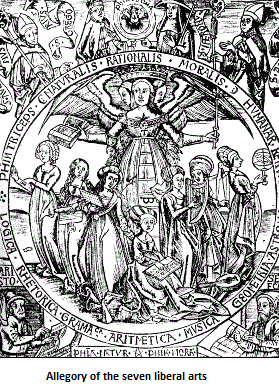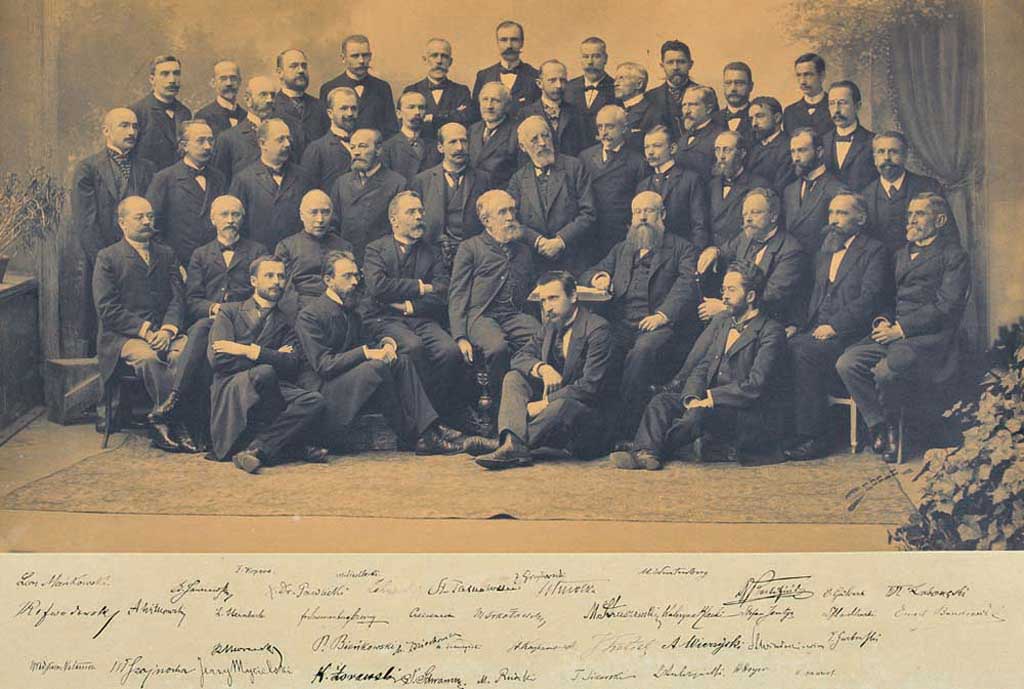History of the Faculty of Philosophy

When the Krakow University was founded in 1364, one of its major goals was to educate the intellectual elite that would help the king in building a centralized state after many years of fragmentation of the Polish realm. Hence, the priority was to create a strong Faculty of Law. It consisted of eight chairs, whereas the Faculty of Medicine had only two chairs, and philosophy was taught by a single scholar: the rector of St Mary's School which played the role of the Faculty of the Liberal Arts.
After its revival in 1400, the Krakow Academy consisted of four faculties: of the liberal arts, theology, medicine and law. In this early period, the Faculty of the Liberal Arts dealt with all the disciplines which are now considered humanities and sciences. Only after graduating from this Faculty, the students were allowed to study at one of the three other faculties.
Until as late as the early 18th century, philosophy at Krakow Academy was taught according to the old scholastic model. New European trends, such as e.g. Bacon's and Descartes' conceptions, were generally unwelcome here, and the lectures on philosophy were, to a large extent, limited to commenting on Aristotle. Even the groundbreaking Kołłątaj's reform changed relatively little in this respect: there was only one chair in philosophy at the Jagiellonian University, and it attracted few candidates. The innovative initiatives of Feliks Jarosiński were rejected, and their author was expelled from the University. However, the actions of his successors, Józef Emanuel Jankowski and Józef Kremer, stimulated interest in the philosophical thought of Kant and Hegel. It was also then, when Michał Wiszniewski initiated studies in the philosophy of common sense. Besides, the Jagiellonian University scholars from that period wrote many important works on the history of philosophy.
Council of the Jagiellonian University Faculty of Philosophy in 1900
After the First World War, several eminent thinkers worked at the Jagiellonian University, the most famous of whom were: Leon Chwastek, who specialized in the field of mathematical logic and philosophy of art, Joachim Metallman, who paid particular attention to the question of determinism in science, and Zygmunt Zawirski, especially interested in the issues between philosophy and physics.
After the Second World War the Faculty of Philosophy changed its name into the Faculty of Humanities, which was later transformed into the Faculty of Philosophy and Social Sciences (1951) and of Philosophy and History (1953). The members of its staff included such famous scholars as Władysław Tatarkiewicz and Roman Ingarden. However, as the new Communist rulers treated philosophy as a discipline subservient to the Marxist-Leninist ideology, these scholars were soon forbidden to teach students. Changes for the better came in the academic year 1956/7, when the Chair in Basics of Marxism-Leninism was finally transformed into the Chair in Philosophy under Prof. Roman Ingarden and the Chair in History of Philosophy under Prof. Izydora Dąbska. In 1960s they became the basis of the newly created Institute of Philosophy.
The present institute consists of eleven departments and one supporting unit.The major fields of research include: ontology, epistemology, axiology, cognitive theory, cognitive science, philosophical anthropology, history of traditional philosophy (including Eastern philosophy) and political philosophy, theory and history of esthetics, formal and philosophical logic, and the areas between philosophy and particular sciences.
Although ethnographic interests had been present at the Krakow Academy much earlier, the first Chair in Ethnography and Ethnology was established in 1925. Jan Stanisław Bystroń became its head. In 1930 the chair was transformed into the Chair in Sociology and Ethnology. After the Second World War, sociology was considered a bourgeois discipline by the Communist authorities, and, consequently, the name of the unit was renamed the Chair of General Ethnography. Besides, the sociological programmes of study were abolished. After the changes in policy after 1956, the Chair in General Ethnography and Sociology, and the Chair of Sociology and Demography were founded. In 1970 they were combined into the Intstitute of Sociology. In the 1980s the JU Institutes of Philosophy and Sociology finally became independent from Marxist ideology and were no longer obliged to teach ideological subjects.
Today, the Institute of Sociology consists of eight departments and one interdisciplinary centre. The main areas of research are, inter alia: sociological theory, social structures, social anthropology, sociology of norms and organizations, population issues, social work, sociology of economy and education, social communication, socio-legal issues, and evaluation of public policies.
As far as psychology is concerned, it has been present at the Krakow Academy for many centuries as an object of interest of philosophy. It became a separate field of study in 19th century, thanks to the lectures of Rev. Feliks Jaroński, a philosopher and a theologian. In the modern sense of the word, psychology was introduced at the Jagiellonian University by Prof. Władysław Heinrich, who, at the beginning of the 20th century, gave lectures and ran the internationally famous Laboratory of Experimental Psychology. His actions resulted in the foundation of the Chair in Pedagogical Psychology headed by Prof. Stefan Szuman. In 1956 psychology became a separate programme of study, and in 1968 the Institute of Psychology was founded.
At present, the Institute of Psychology consists of eight departments and one supporting unit. The research is focused on such issues as, inter alia: personality, cognitive processes, development mechanisms, language, creativity, intelligence, stress, and child development.
Pedagogy was taught at the JU as early as in the first half of the 19th century, by such scholars as Wacław Voigt, Feliks Jaroński and Prof. Józef Jankowski. In 1833 the Chair in Religion, Pedagogy and Greek Language was established at the Faculty of Theology. In 1921 the Pedagogical College was created at the Faculty of Philosophy, and four years later the Chair in Pedagogy was founded. One year after its foundation pedagogy became a separate programme of study. In the 1970s the independent Institute of Pedagogy was established. Presently, it consists of seven Departments that specialize in such issues as: history of pedagogical thought, different aspects of education, child and youth development, the role of culture, art, and values in educational process, and the issues of crime and rehabilitation.
In 1973 the Institute of Religious Studies was founded at the Faculty of Philosophy. Its initial purpose, intended by the Communist authorities, was the criticism of, or even fight against religion. The situation changed in the 1980s, when the Institute lost its ideological character. Today it consists of seven departments. The research concerns a wide range of issues related to: phenomenology and anthropology of religion, history of religion, philosophy and sociology of religion, and the relations between Church and State.
In 2005 the Senate of the Jagiellonian University decided to transform the Department of Comparative studies of Civilizations into the Chair in Comparative Studies of Civilizations: an autonomous unit within the Faculty of Philosophy, specializing in education and research on the major civilizations of the modern world.
Main source: Janusz Mizera, "Zarys Dziejów Wydziału Filozoficznego." J. Miklaszewska, J. Mizera (ed.) "Wydział Filozoficzny. Złota Księga" Kraków: Księgarnia Akademicka, 2000.




